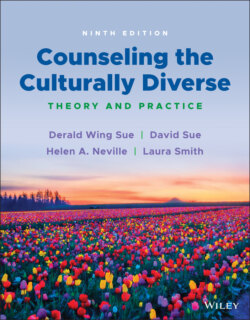Читать книгу Counseling the Culturally Diverse - Laura Smith L. - Страница 84
PATTERNS OF CULTURAL ASSUMPTIONS AND MULTICULTURAL FAMILY COUNSELING/THERAPY
ОглавлениеAs we've just seen, the worldviews and traditions of many communities of color have elements that lie outside the taken‐for‐granted assumptions that underlie conventional Western models of therapeutic theory and practice. The practice of family counseling offers a useful opportunity for exploration of still more of these elements, as the family unit itself takes on different meanings and significance across diverse cultures.
Dior Vargas, a 28‐year‐old Latina mental health activist, recalls a therapist in college—her second one—who she stopped going to after realizing she was “culturally incompetent.” “She wasn't aware of how close‐knit Latino families are. That they are a part of my decision‐making process. My therapist didn't understand that, she would say: ‘No, you need to stand up to your mother.’ That felt very disrespectful to me. Maybe sometimes you do, but the way she said it made me very defensive.” (Hackman, 2016, para. 5)
Family counseling or therapy may be conducted as marital or couple counseling, parent–child counseling, or work with more than one member of a family. Family systems therapy possesses several important characteristics (Corey, 2013; McGoldrick, Giordano, & Garcia‐Preto, 2005):
It highlights the importance of the family (versus the individual) as the unit of identity.
It focuses on resolving concrete issues.
It is concerned with family structure and dynamics.
It assumes that these family structures and dynamics are historically passed on from one generation to another.
It attempts to understand the communication and alliances via reframing.
It places the therapist in an expert position.
Many of these qualities would be consistent with the worldviews of Persons of Color. The problem arises in how they are translated into concepts of what “the family” is, or what constitutes a “healthy” family. Some of the characteristics of healthy families assumed by therapists may pose obstacles to therapy with various culturally diverse groups. They tend to be connoted with value orientations that are incongruent with the value systems of many culturally diverse clients (McGoldrick et al., 2005). According to conventional family systems theory, healthy families:
Allow and encourage the free and open expression of emotion.
View each member as having a right to be his or her own unique self (i.e., to individuate from the emotional field of the family).
Strive for an equal division of labor among family members.
Consider egalitarian role relationships between spouses desirable.
Hold the nuclear family as the standard.
These orientations were first described by Kluckhohn and Strodtbeck (1961) as patterns of “American” values. How can we begin to consider whether (or not) notions like these coincide with the traditional value systems of other cultural groups? Table 3.2 summarizes five general dimensions of European American culture and contrasts them with those of four groups of color as part of an examination of culture within the family therapy process (Ho, 1987).
